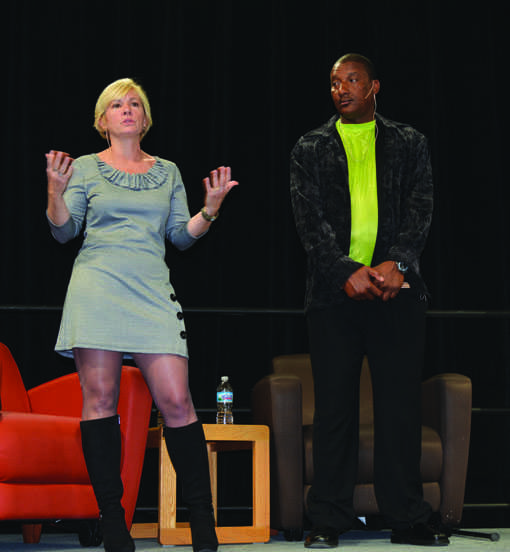Controversial rape case discussed at UW-P
On April 2, Distinguished Lecturers Ronald Cotton and Jennifer Thompson, co-authors of “Picking Cotton,” visited the University of Wisconsin-Platteville to share their personal, controversial story about a previous rape case.
“Picking Cotton” chronicles the story of how Cotton was incarcerated for 11 years for a crime that he did not commit: the rape of Jennifer Thompson in 1984.
The two authors also starred in the 1997 Frontline special “What Jennifer Saw,” after DNA testing two years prior to the television episode discovered that the true culprit of Thompson’s rape was a man named Bobbi Poole.
Thompson managed to escape and seek refuge in a neighbor’s home, and later would falsely identify Ronald Cotton as the perpetrator, strongly believing that he was the culprit at the time.
Over time, Cotton proved through a 1995 DNA test that Bobbi Poole, a fellow inmate, was Thompson’s rapist and had in fact raped another woman during the same evening.
Two years later, Thompson and Cotton met and developed a friendship that would later invoke international attention and culminate in the pair traveling the country and speaking about their book “Picking Cotton.”
At the Pioneer Activity Center, Cotton and Thompson began their speeches by reflecting on the evening that changed their lives forever.
While in prison, Cotton spent a majority of his time dealing with his frustration about his false conviction.
“I used to work out every day, hitting the speed bag,” Cotton said.
Furthermore, Thompson described a similar frustration and inability to externalize her experiences for a great deal of time after the horrific event.
“My family never talked about it,” Thompson said. “They don’t understand.”
Also, Thompson discussed her immense work effort and admirable achievements throughout her life prior to the rape case.
“I had the perfect life,” Thompson said. “The judge told me that I could move on with my life, but I couldn’t. My life was over.”
Eventually, Cotton and Thompson decided that they were tired of dealing with their anger and frustration, and began to understand that they had the right to be happy in life.
When Thompson met Cotton for the first time in 1997, he became more dedicated to promoting the well-being of others and decided to refrain from feeling any amount of hatred for Thompson’s false identification of the perpetrator.
“I used to drive in my truck with a jack in the back, just in case somebody had a flat tire,” Cotton said.
Thompson had apologized for Cotton’s conviction and he forgave her many years ago, but the war against injustice does not end with their case being solved.
They have become advocates for DNA testing, and they also support the argument that more money should be put into school systems rather than prisons.
“The criminal justice system is designed to put people away,” Thompson said. “It’s no different than slavery.”
The attendants’ responses were thoroughly positive, with the presentation ending in a standing ovation from the audience.
Rashan Blocker-Nelson, a criminal justice major, was moved by the presentation.
“[Cotton] is a strong man to forgive her,” Blocker-Nelson said.
Cotton and Thompson’s presentation explored various issues within the field of criminal justice and shared their life-changing experiences with students and faculty members in order to raise awareness of racial profiling and modern DNA testing throughout future cases.




